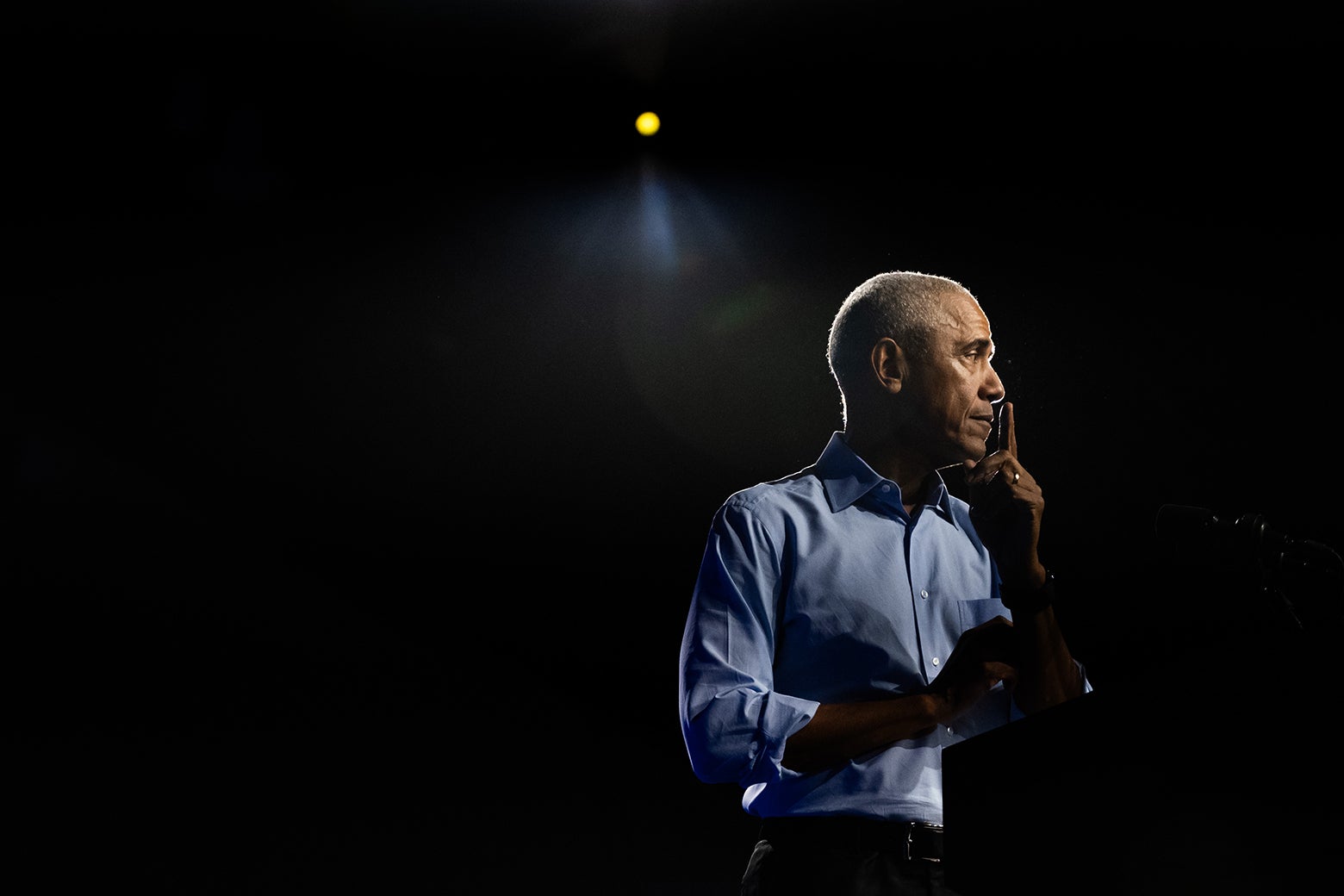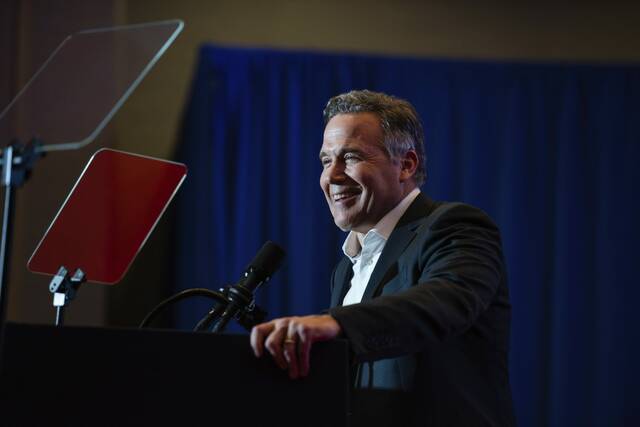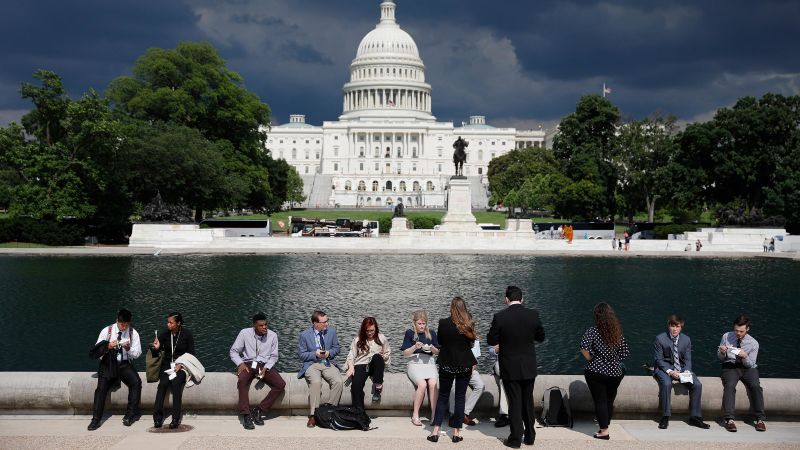Sign up for the Slatest to get the most insightful analysis, criticism, and advice out there, delivered to your inbox daily.
With the dust now settled on the presidential election, dismayed Democrats have begun taking stock, which is not to be confused with taking accountability. How should the party respond to its decisive second loss to Donald Trump, who left office in 2021 with the lowest approval rating of all time?
One answer that seems to be coming resoundingly from Barack Obama-era veterans is a return to Obama-style politics. That was made clearest in an uproar-raising episode of Pod Save America, which featured 90 minutes of Kamala Harris’ four most senior campaign directors talking about what went wrong to contribute to Harris’ defeat.
The very long conversation was dominated by former Obama 2008 campaign manager David Plouffe and Obama 2012 deputy campaign manager Stephanie Cutter—both of whom came off the bench to helm Harris’ campaign after Biden dropped out—talking with Dan Pfeiffer, who took over Plouffe’s old job as a senior adviser to Obama. Jen O’Malley Dillon and Quentin Fulks, both of whom were on the Biden and Harris campaigns, were present, too. To round things out, Jon Lovett, Jon Favreau, and Tommy Vietor, the hosts of Pod Save America, also all worked in the Obama White House.
In short, this was the Obama wing of the Democratic Party talking to itself, and what did it find? Herein lies the controversy: Those campaign stalwarts found that, by and large, they did a great job on Harris’ campaign, that the race was basically unwinnable, that frustrated Democratic voters—who can’t believe that they got swept by the least popular president in American history—are being unfair and uncharitable to the strategists’ efforts in what was a very compressed campaign season.
This, despite the fact that the Harris campaign parlayed a truly unbelievable $1.5 billion, a massive cash advantage, into the first Democratic popular vote loss in 20 years. Harris was unable to move one single state in her direction (all 50 went more toward Trump than in 2020), and, according to pollster Patrick Ruffini, the first since 1932 to not flip a single county.
Meanwhile, Democratic vote share collapsed in blue strongholds, as base Democratic turnout dipped substantially. That comes as no surprise, as seemingly the entire campaign was pitched toward courting mythical right-leaning moderate voters, a very Obama-style political maneuver. This was the justification for Harris spending so many days on the campaign trail with Republican Liz Cheney. Harris did perform better in those swing states where she campaigned and spent lavishly than in those places where she did not, but those Nikki Haley–voting Republicans simply did not materialize in winning numbers.
Yes, there were tough headwinds; incumbent political leaders all over the globe lost in record numbers this year. But as the New York Times reported in the days before the election, the Harris campaign’s affiliated super PAC was alarmed by senior Harris campaign staff’s insistence on focusing so intensely on Trump’s character and warning of his fascist tendencies in the final stretch. That decency message—a very Obama-style flourish—was being favored over a more pugilistic, economic-policy-forward message. “Purely negative attacks on Trump’s character are less effective than contrast messages that include positive details about Kamala Harris’s plans to address the needs of everyday Americans,” an email from the super PAC read.
When the campaign tapped Obama himself to hit the trail, he leaned so far into the decency messaging that he set about scolding Black male voters who dared not vote for Harris. As a demographic group, Black men went on to nearly double their support for Trump over 2020.
The failure of the “Trump Is Bad” approach implicates Pod Save America, too. According to nearly every campaign postmortem, the ecosystem of sort of sloppy right-wing podcasts played a critical role in elevating Trump, swamping the influence of the podcast which is the brightest beacon of Obama-style politics, and—in an ideal world—would have figured as the Democratic answer in this media environment. The Pod Save America episode with the Harris staffers was met with a firestorm of criticism online from commenters and journalists who bristled at the self-satisfied tone and lack of soul-searching. Needless to say, the pod did not save America.
The results are clear: The Democrats need to do something really different. And yet the Obama wing of the party, which basically took over Harris’ campaign, now insists that the only solution is a return to even more Obama-style politics: more moderation, an embrace of big money and friendlier dealings with Wall Street and Silicon Valley, and a less combative stance toward Republicans. It’s the line of thinking that led Harris to refuse to commit to keeping President Joe Biden’s Federal Trade Commission chair Lina Khan, who has gone after Big Tech and Big Pharma—or just hammer corporate greed in any way, at all. This was a clear break from the Biden presidency.
“We have to dominate the moderate vote,” said Plouffe on the podcast, of his prescription for the future. “And I think as we look ahead towards ’26 and ’28 … we obviously have to get some of that back, we can’t afford any more erosion there.” Maybe I’m missing something, but the post-loss diagnosis sure seems like “We did everything right” and the post-loss prescription seems to be “More of what we just did.”
David Axelrod, the former chief strategist on both the Obama 2008 and Obama 2012 campaigns, is pushing for the same thing. He recently began advocating for former Obama chief of staff Rahm Emanuel to be reinstated as the Democratic National Committee chair. Emanuel is perhaps best known for his willingness to go to war with the party’s left flank, rather than Republicans, and his colorful contempt for unions.
And yet, not even Emanuel himself seems to believe in the efficacy of Obama-era policy and politics. In a pretty stunning CNN interview this week, Emanuel went off on the legacy of policy decisions he and his former boss had a direct role in implementing.
“The Iraq War, in which the American people were deceived, spent trillions of dollars, thousands of soldiers lost their lives … people were deceived and lied into a war and not one person responsible for that deception ever was held accountable,” he said. “Six years later, the financial industry lies to the American people, people lose their homes, their livelihoods, and the bankers are screaming for their bonuses. Nobody held accountable.”
Of course, it was the Obama administration, and Emanuel himself, that proudly chose the route of no accountability for these actors, for both the Iraq War and the financial crisis, stressing a need for comity with Republicans and Wall Street and a desire to turn the page.
Interestingly, Harris campaign adviser Cutter built her national reputation as an adviser to Obama Treasury Secretary Timothy Geithner, where, according to the New York Times, “she protected Geithner’s fragile reputation and tried to spin unpopular policies like the Troubled Asset Relief Program and the A.I.G. bailout.” The TARP program was perhaps the most scandalous bank bailout program of all, one that was meant to prevent the foreclosure crisis but ended up as a Wall Street bonanza rife with fraud, and did substantial damage to Americans’ view of their own government.
For good reason, Democrats pine for the days of Obama where the top of the ticket was beloved by Americans. But Obama was a singular political talent, and going back to Obama-era political strategies won’t solve the problems facing Obama-less Dems. While Obama himself cruised through two presidential elections, Democrats not named Obama got obliterated in that period: In the eight years he was president, the party lost a total of 15 state House chambers, 14 state Senate chambers, 960 state legislative seats, 10 governorships, 62 seats in Congress, and 11 seats in the Senate.
President Biden, despite his profound personal unpopularity, almost certainly had the party closer to a winning program: his economic populist approach, his antitrust agenda, his embrace of unions, and his broader social spending were all taken up by the Trump campaign at some level, bespeaking an obvious popularity that was backed up by polling. This has not gone unnoticed by some of the biggest boosters of centrism. New York Times opinion columnist David Brooks recently posited that maybe “in order to win working class votes in an era of high distrust, the Democrats have to do a lot of things that Bernie Sanders said they should do.”
That tension over the future of the Democratic Party hasn’t broken out into civil war yet. But it remains an unresolved issue, and those factions will begin battling it out more openly come January, when the next DNC chair is chosen.
2024-12-09 10:35:00




